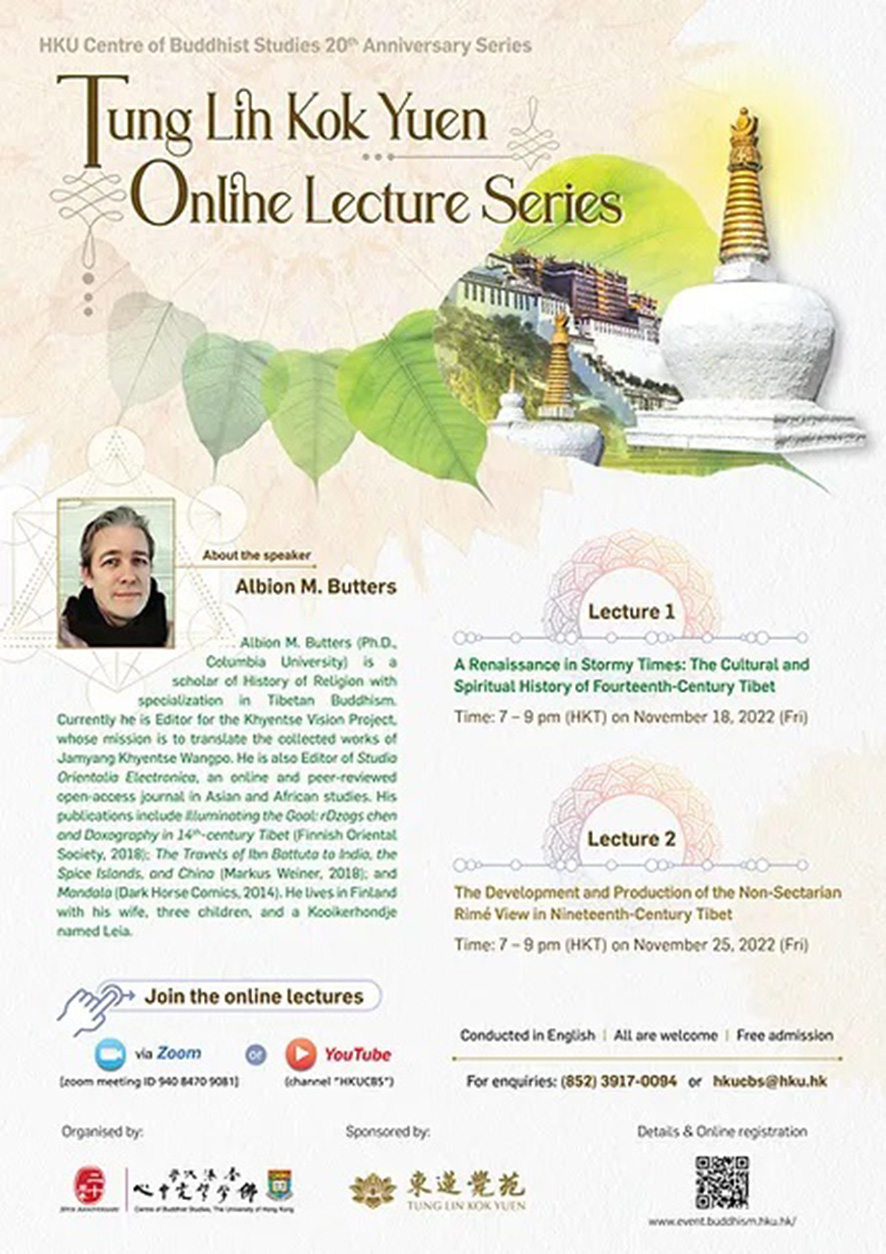HKU Centre of Buddhist Studies 20th Anniversary Series
Tung Lin Kok Yuen Online Lecture Series
| Dummy | Dummy |
|---|---|
| Speaker: | Dr. Albion M. Butters |
| Time: | Lecture 1: 7-9 pm (HKT) | 18 Nov 2022 (Fri) Lecture 2: 7-9 pm (HKT) | 25 Nov 2022 (Fri) |
| Language: | English |
| Type: | All are welcome | Free admission |
| Organized by: | HKU Centre of Buddhist Studies |
| Sponsored by: | Tung Lin Kok Yuen |
| Enquiry: | hkucbs@hku.hk | (852) 3917 0094 |
Live Link:
About the Speaker:
 Dr. Albion M. Butters
Dr. Albion M. Butters
Albion M. Butters (Ph.D., Columbia University) is a scholar of History of Religion with specialization in Tibetan Buddhism. Currently he is Editor for the Khyentse Vision Project, whose mission is to translate the collected works of Jamyang Khyentse Wangpo. He is also Editor of Studia Orientalia Electronica, an online and peer-reviewed open-access journal in Asian and African studies. His publications include Illuminating the Goal: rDzogs chen and Doxography in 14th-century Tibet (Finnish Oriental Society, 2018); The Travels of Ibn Battuta to India, the Spice Islands, and China (Markus Weiner, 2018); and Mandala (Dark Horse Comics, 2014). He lives in Finland with his wife, three children, and a Kooikerhondje named Leia.
Lecture Summary
Lecture 1
A Renaissance in Stormy Times: The Cultural and Spiritual History of Fourteenth-Century Tibet
Time: 7:00 – 9:00 pm (HKT) on November 18, 2022 (Fri)
Marked by power struggles and canonical tensions, the fourteenth century was also a time of renaissance in Tibet. This lecture provides a historical overview of that tumultuous period and its most significant contributions, including various heterodox philosophical moves, alternative soteriologies, and radical spiritual movements. These are examined through the lens of the great Nyingma scholar and yogi Longchen Rabjam and his relationship with contemporaries from the other Buddhist schools of Tibet.
Lecture 2
The Development and Production of the Non-Sectarian Rimé View in Nineteenth-Century Tibet
Time: 7:00 – 9:00 pm (HKT) on November 25, 2022 (Fri)
This lecture explores the Rimé view that emerged in nineteenth-century Tibet from two angles. First, it explores the meaning and epistemological significance of Rimé as a non-sectarian and ecumenical attitude toward the teachings and practices of different Buddhist schools. Second, it locates Rimé in its historical context and in relation to the major figures who promulgated it, such as Jamyang Khyentse Wangpo and Jamgön Kongtrul. And third, it examines Rimé in practice, highlighting how it was applied—and can still be found today—in the literary tradition surviving from that period.
